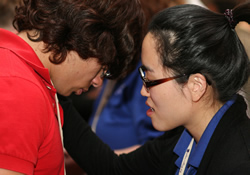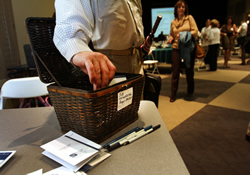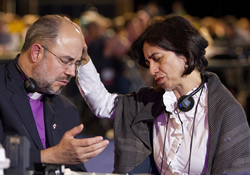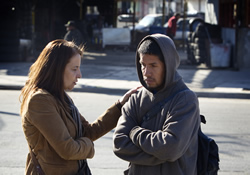Bishop Ken Carter and others discussed intercessory prayer in a webinar that originally aired on May 16, 2013.
Access the archived program, 'Pray for Me: Intercessory Prayer Part' at www.umc.org/pray.

Those already serving in ordained ministry pray with young adults considering their call to ministry duirng Exploration 2011 in St. Louis.
UMNS FILE PHOTO/KATHY GILBERT
'Teach Us to Pray' series
For 28 years, I was a pastor in local congregations. Besides the recurring pattern of the Christian year, celebrations of Christmas and Easter, weddings, memorial services, visitation of the sick and confirmation classes, the request for intercessory prayer is a constant.
On the way out of a service, an elderly man will say quietly, "Please pray for my wife"; an email message arrives: "Please pray for my sister who lives in another state." Or the request may be more direct: "Pray for me. I have a real challenge ahead."
I have always responded that I would pray. But in reality, and in hindsight, my actual response was at times perfunctory: a fleeting thought or just writing down a name on a page, to give to others later. I was being asked for spiritual help and attention, but I was not giving the request the engagement it merited.
Even more troubling was the knowledge that many expect the ordained—those set apart—to have the expertise and the time to provide this spiritual support. Intercessory prayer is not exclusive to ordained clergy—we share intercession with all of God's people.
Here I will share some of what I have learned so that you may be more prepared when someone says to you, "Pray for me."
The Bucket
The words pray for me signal a person in need. And when someone is in need—because of illness, a broken relationship, loss of work, a spiritual crisis or grief, it is as if he or she is carrying a heavy bucket—a bucket filled with emotion, filled with grief, filled with confusion, filled with disappointment.
I learned about the bucket image from a pastor friend. This powerful image of the bucket has elucidated intercessory prayer for me.

An attendee at the Roswell (Ga.) United Methodist Church Job Networking Ministry adds a slip to the prayer request basket.
UMNS/KATHLEEN BARRY
A person in need or in grief is carrying around this bucket of emotion. An intercessor is one who comes alongside that individual with an empty bucket. The person in need gives his or her agenda to the intercessor, and the intercessor receives that agenda as the work of God, namely prayer. Intercession is carried out by those with enough space in their lives to include the needs of others: family, friends, congregations, communities and the world.
Emptying Ourselves
Let the same mind be in you that was in Christ Jesus, who, though he was in the form of God, did not regard equality with God as something to be exploited, but emptied himself, taking the form of a slave, being born in human likeness. And being found in human form, he humbled himself and became obedient to the point of death—even death on a cross. (Philippians 2:5-8)

Bishop Marisa de Freitas Ferreira (right) of the Methodist Church of Brazil prays for Bishop Adonias Pereira do Lago during worship at the 2012 General Conference.
UMNS/MIKE DUBOSE
Intercessors follow the example of Jesus, and we need to consider the cost of having the mind that was in Christ Jesus. Intercession requires emptying oneself on behalf of another.
When we worship, we move into the presence of a Holy God. We offer gifts of praise and silence, listening and humility, adoration and repentance. We place these gifts upon the altar. We gaze upon the greatest act of intercession, the cross of Jesus Christ. And we remember that Jesus continues to pray for us. He is the great high priest, seated at the right hand of God.
To make intercession is to worship God. All along the way, we are praising the God who shares our prayers, who is "our help in ages past, our hope for years to come." We "lay aside every weight and sin that clings so closely" (Hebrews 12:1). We empty ourselves. We look to Jesus, who emptied himself, who endured the cross, who is seated at the right hand of the throne of God (Hebrews 12:2).

Government official Carolina Anda Gonzalez (left) prays with Francisco Luz at "El Bordo," along the Tijuana River in Tijuana, Mexico, during an Advent gathering at the wall separating family members in Mexico and the United States.
UMNS/MIKE DUBOSE
As you journey more deeply into a life of intercession, imagine that you are a part of a great procession approaching the throne of grace. You are not alone. You are laying your burdens before the altar. You are preparing for something. Perhaps you are preparing for a more profound ministry of intercession.
I have learned to honor the request "pray for me." It is a cry for help, however it may be expressed. It is an acknowledgment that we are limited and finite creatures. It is a trust placed in a higher power. It is always prompted by a situation that would not be desired: an illness, a loss, a need, a crisis, a doubt—and yet it is always an occasion for the grace of God, whose power is made perfect in our weakness (2 Corinthians 12:9).
That intersection—God's power and our weakness—lies at the heart of intercession. May the grace of God lead you into a deepened life of prayer for others.
From Pray for Me: The Power in Praying for Others © 2011 Kenneth H. Carter, Jr. Reprinted by permission from Upper Room Books, http://books.upperroom.org. Bishop Kenneth H. Carter Jr., now episcopal leader of the Florida Area, was senior pastor of Providence United Methodist Church in Charlotte, N.C., when he wrote the book.
Two models for intercessory prayer
Bishop Kenneth Carter offers two models of intercessory prayer in "Pray for Me".
A Personal Model: Seven Days of Intercession
- Pray on Sunday for the church, the pastor(s) and staff, and Sunday school teachers.
- Pray on Monday for your work in the world, for those who are seeking employment or struggling with vocational decisions.
- Pray on Tuesday for your family.
- Pray on Wednesday for your friends.
- Pray on Thursday for the emerging needs in the world.
- Pray on Friday for your enemies.
- Pray on Saturday for people in your life with special needs or challenges.
In the second model, each member of the congregation chooses five people for whom they will pray over a 40-day period.
From "Pray for Me": The Power in Praying for Others © 2011 Kenneth H. Carter, Jr.
The Living Prayer Center
The Upper Room Living Prayer Center is a seven-day-a-week intercessory prayer ministry staffed by Christian volunteers.
Submit a prayer request via the website, http://prayer-center.upperroom.org. It will be emailed to covenant prayer groups around the world.
Call the center at 800-251-2468 (7 a.m.-11 p.m. CT), and a volunteer will pray with you. The request will be also emailed to covenant prayer groups
The Center also welcomes new prayer volunteers.
- Answer the forwarded prayer phone line for at least a two-hour time slot that fits your schedule.
- Become a prayer partner receiving weekly prayer requests via email and praying for those in need.
Learn more at http://prayer-center.upperroom.org.
